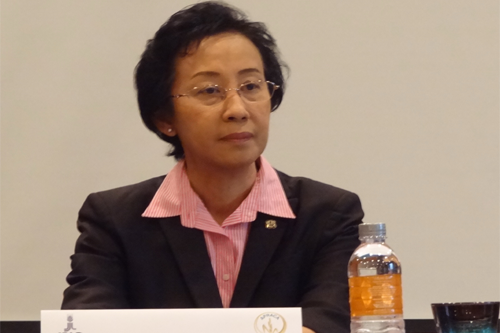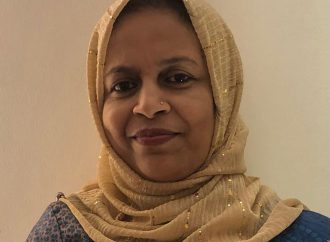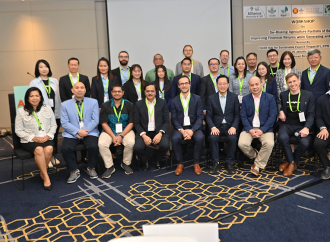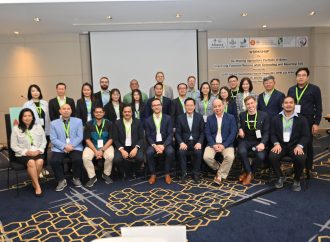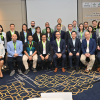Welcome remarks by Ms. Poonsook Musiklad, Senior Executive Vice President, Bank for Agriculture and Agricultural Cooperatives (BAAC), Thailand At Inception workshop of the IFAD supported Project, Amari Watergate hotel, Bangkok, 28 March 2013 at 9.00 a.m. Mr. Kim Vada, Acting APRACA Chairman and Director General, Bank Supervision, National Bank of Cambodia; Dr. Ganesh B. Thapa,
Welcome remarks
by
Ms. Poonsook Musiklad, Senior Executive Vice President,
Bank for Agriculture and Agricultural Cooperatives (BAAC), Thailand
At Inception workshop of the IFAD supported Project,
Amari Watergate hotel, Bangkok,
28 March 2013 at 9.00 a.m.
Mr. Kim Vada, Acting APRACA Chairman and Director General, Bank Supervision, National Bank of Cambodia;
Dr. Ganesh B. Thapa, IFAD Asia and the Pacific Regional Economist;
Dr. Prakash Bakshi, NABARD Chairman,
Mr. Won-Sik Noh, APRACA Secretary General
Distinguished resource speakers
Distinguished participants
Ladies and Gentlemen: Good morning.
On behalf of Bank for Agriculture and Agricultural Cooperatives (BAAC), I wish sincerely to congratulate you all on the occasion of the convening of the inception workshop of the IFAD-supported APRACA FinServAccess Project.
At the outset, I would also like to express my deepest gratitude to IFAD for its long years of collaboration since 1996 and financial support to APRACA in strengthening rural financial structures and systems in the Asia-Pacific region, involving our APRACA members as well as their respective strategic partners. It is generally acknowledged that this support from IFAD is a very significant contributing factor to the realization of APRACA’s goals and objectives.
The FinServAccess project builds on the recently concluded five-year FinPower Programme through critical assessment of factors contributing to sustainable rural/microfinance and the meeting of minds among stakeholders through policy dialogues. As mutual learning and sharing are important components of the project, it aims to replicate innovations and best practices, strengthen capacities at managerial and technical levels and build on the wealth of knowledge of APRACA members and its partners. We are gathered here today to jumpstart the FinServAccess Project, concur on and finalize key project technical and administrative components.
BAAC expresses its deepest appreciation for APRACA’s trust and confidence in the bank as an important contributor of expertise in rural and agricultural finance. BAAC is one of the founding members of APRACA, held the APRACA Chairmanship twice- in 1984-1986 and then again in 2005- 2008, and offered its bank branches and projects as laboratories for studies and observation-visits. It is also expanding the horizons of APRACA in the four thematic areas of the FinServAccess project- value chain finance, risk management, renewable energy financing and microfinance for agriculture.
Please allow me to make reference to the experiences of Thailand, in general, and of BAAC, in particular, in expounding the main concerns of this workshop.
Agriculture plays a crucial role in the growth and development of Thailand. The share of agriculture in the GDP in 2012 is 8.4%. Though its share of the GDP has continuously declined from 9.8% in 2009, there is however an increase in the total volume of agricultural products, particularly rice, rubber, cassava and oil palm.
Thailand produces a total of 20.4 million tons of milled rice in 2011/12 crop year, consuming some 50% and the rest for exports and other purposes. Thailand is well acknowledged as the top rice exporter in the world, exporting volume was a total of 10.64 million tons of rice in 2010. However, the floods in 2011 devastated major agricultural areas of Thailand, wiped out significant rice crops in the central plains, forced millions to leave their homes and destroyed numerous rural assets and properties. Though the natural disaster hampered agricultural production, Thailand still has milled rice surplus to supply to the world.
Rural finance has facilitated agricultural production. It is in this aspect that BAAC, now the premier rural development bank in the country, has gained prominence. In 1966 the government established the Bank for Agriculture and Agricultural Cooperatives (BAAC) as a state enterprise under the jurisdiction of the Ministry of Finance. Now close to its 50th Golden anniversary, the bank aims at becoming the Premier Rural Development Bank by concentrating mainly on the uplift of the people’s life quality coupled with the promotion for sustainable consumption of natural resources and environmental supervision.
The total assets of BAAC now stand as of February 2013 at 1.18 trillion Baht or US$ 39 billion in dollar terms. Its lending program, primarily providing retail credit to individual farmers (which are organized into joint liability groups), accounted for 74.5 % of the total loan portfolio and the rest for wholesale credit to farmer institutions, consisting of agricultural cooperatives and farmer associations. By 2012, BAAC has covered a total of 6.72 million farm households or 92.7 % of all farm households in Thailand.
Previously relying on government budget, borrowing from central bank and overseas, and on commercial banks’ deposits, BAAC has gradually built its own strong deposit base and has become self-reliant in its rural financing functions. Now, BAAC has generated a total of 986 billion baht savings or US$ 33 billion through its now famous Thaweesin savings schemes. This is a savings-cum-lottery product that provides depositors with chances to win big prizes.
In addition, BAAC also provides personal accidental insurance, health insurance, funeral aid and services to help Thai Muslims undertake their Mecca pilgrimage. The bank also enhances liquidity in rural community, improves farm production efficiency and cost reduction, establishes village funds and sufficiency economy funds, and creating the unemployed home coming project and designs model community development applying the concept of Sufficiency Economy, as espoused by His Majesty the King in His Sufficiency Economy Philosophy. This Philosophy helps to introduce the concept of moderation, reasonableness, and resilience to change to our new way of doing banking business. BAAC now goes beyond savings and loans to reach sustainable development. A concept of credit plus technical assistance has been implemented by BAAC to promote value addition activities with knowledge dissemination.
BAAC continues to enter into the government’s agricultural produce pledging scheme, futures market and crop insurance. The bank creates production and marketing linkage through cooperatives and their apex organization – Thai Agribusiness Company or TABCO, a company owned 90% by farmers and 10% by BAAC.
To ascertain that rural financial services are fully provided at grass roots level, BAAC has now a total of 19,922 officers and staff in 77 provincial offices and 1,118 branches throughout Thailand. Thus, BAAC has been and will remain a key player in rural finance in Thailand and I am happy to note that BAAC is invited to be a part of the project inception workshop. I also acknowledge the presence of NABARD Chairman Dr. Prakash Bakshi and highlight NABARD’s role as one of the knowledge pillars of APRACA, giving to the world the concept of sustainable bank-self-help group linkage scheme.
I also wish to convey APRACA’s appreciation of the crucial role played by the UN-FAO in establishing APRACA in 1977 and its continuing support to agriculture and agricultural finance, in particular through the conduct of thematic workshops. Additionally, the presence of our other international development partners- AFI – and our NGO partners from Bangladesh, Cambodia, Myanmar and Nepal as well as our APRACA members and participating IFAD projects lend luster and depth to our project inception workshop.
Finally, I wish you all a very successful workshop and a very memorable and pleasurable stay in Thailand. Please find time to savor the famous Thai hospitality.
Thank you.


